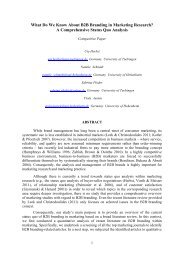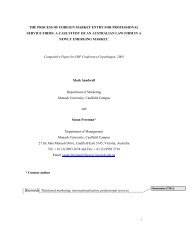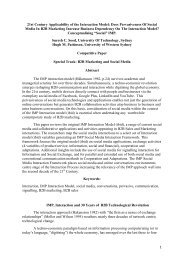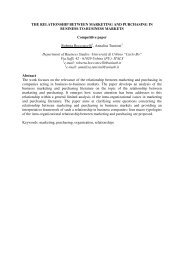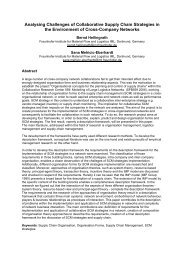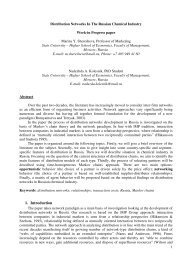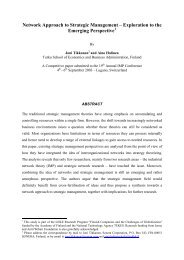Mobile Network Operators and Cooperation - IMP Group
Mobile Network Operators and Cooperation - IMP Group
Mobile Network Operators and Cooperation - IMP Group
You also want an ePaper? Increase the reach of your titles
YUMPU automatically turns print PDFs into web optimized ePapers that Google loves.
150 CHAPTER 5. MOBILE PAYMENT AND CONTACTLESS SERVICES<br />
Identified obstacles<br />
The GSMA itself <strong>and</strong> others have identified a number of obstacles or "roadblocks"<br />
for the development of NFC based services, see [243] <strong>and</strong> [244]. Initially there<br />
was no clear roadmap for NFC enabled mobile phones. There existed a number<br />
of different technical solutions with a risk of market fragmentation. Today the<br />
st<strong>and</strong>ards are under completion <strong>and</strong> SIM card is seen as a legitimate solution for<br />
the NFC secure element. GSMA is also engaging the industry to define a UICC<br />
certification process for NFC Services.<br />
The lack of commercially available Single Wire Protocol (SWP) NFC h<strong>and</strong>sets<br />
is another main issue. Here, GSMA has developed as SWP device requirements<br />
document to be used by mobile operators as a basis for SWP h<strong>and</strong>set procurement.<br />
Another area of main concern is the lack of contactless point-of -sales (PoS) infrastructure<br />
or a lack of underst<strong>and</strong>ing of drivers <strong>and</strong> mechanisms for global deployment<br />
of contactless infrastructure. GSMA is engaging with the financial industry<br />
<strong>and</strong> retailers to underst<strong>and</strong> the deployment plans for contactless infrastructure<br />
Finally, both the business models as well as strategies for co-operation between<br />
between players in the ecosystem are unclear. The roles <strong>and</strong> responsibilities of actors<br />
involved in trusted service management are unclear. According to GSMA [243]<br />
"the mobile network operators are engaging with key ecosystem players within<br />
their respective markets to address this issue."<br />
The pilot projects <strong>and</strong> trails mentioned below may one way to address this issue.<br />
These opinions about obstacles from the industry organization GSMA is supported<br />
by an expert survey presented by VTT, [253]. This study indicates that the<br />
most important NFC drivers <strong>and</strong> obstacles are related to the business, technology<br />
<strong>and</strong> end-user aspects. The obstacles for use of NFC technology <strong>and</strong> services in<br />
public transportation was found to be<br />
• Unclear Business <strong>and</strong> Co-operation Models<br />
• Lack of Underst<strong>and</strong>ing Benefits or Costs<br />
• Lack of NFC Devices<br />
When it comes to pilot projects <strong>and</strong> trials the need to include also business<br />
model, revenue <strong>and</strong> costs aspects is highlighted:<br />
"From this perspective it can be argued, that besides the testing of technical functionality<br />
<strong>and</strong> use-case concepts, the NFC pilots in the future should concentrate on<br />
business models, money flows, concrete benefits <strong>and</strong> real costs. This would also<br />
create the basis for robust business cases <strong>and</strong> mass market feasibility, which are<br />
needed to encourage different stake holders to make investment decisions. Analysis<br />
reveals that the most important NFC restraints <strong>and</strong> drivers are related to the<br />
business, technology <strong>and</strong> end-user aspects"



